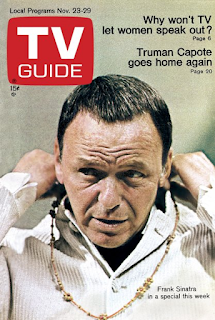This week in TV Guide: November 23, 1968
 Doesn't it seem as if we just celebrated Thanksgiving here last week? Well, I did warn you this was coming, so if you've had your fill of turkey, feel free to skip skip over that, but stay for the rest.
Doesn't it seem as if we just celebrated Thanksgiving here last week? Well, I did warn you this was coming, so if you've had your fill of turkey, feel free to skip skip over that, but stay for the rest.And this week, "the rest" means Marya Mannes' provocative article on the lack of women in television news. Oh, there's Pauline Frederick, NBC's UN correspondent; Marlene Sanders, who has the afternoon news update on ABC; Liz Trotta, reporting from Vietnam for NBC; and Mannes herself, who had her own show on WNEW in 1959 and has been a frequent radio and television commentator since.*
*It's interesting that Barbara Walters isn't included in this group, but then , even though she's now co-host of Today with Hugh Downs, she isn't apparently taken seriously as a journalist.
"[I]t is a fact," Mannes writes, "that the only national television female of real authority is Julia Child." That's because women are supposed to be experts on food; nobody cares that she doesn't look like Raquel Welch; "in fact, quite properly, they care for her more because she is, simply, herself." But put a woman behind the news desk and the situation changes quickly. For starters, "she should look young and smooth-faced, and who can be that after 20 or 30 years of training, involvement and experience?"* As one network executive says, who "wants to look at a middle-aged dame, especially if she's bright?" Such a one would be likely to remind men of their mothers, wives, or mothers-in-law, "always talking or laying down the law."
*See Fox News, for example, although to their credit, (a) they aren't the only ones with attractive women anchoring the news, and (b) some of their reporters are not only quite good, they're also quite experience. Nonetheless, if the shoe fits,...
Mannes makes an interesting argument that television is, after all, entertainment; therefore, why aren't more women in news? The exceptions to the rule—public affairs programs such as WNBC's For Women Only (which, Mannes notes, is a stupid name for the show) are shown in the morning, which means housewives can watch—but what about prime time? Mannes acknowledges that there's still a "deep-seated resentment" to career women, which, interestingly, she says is"quite understandable in the case of militant females who bulldoze their opinions with strident voices, contorted faces and guerrilla tactics." Even worse, perhaps, are "those silken-voiced, super-groomed ladies who use the guise of femininity to conceal a vaulting and implacable ambition."
What Mannes looks forward to is the time when it won't matter if the news is presented "by a man or a woman, or whether, if a woman, she is young or not young, neither a fashion model nor a Playboy centerfold." (Again, see Fox.) By their very nature, Mannes says, women have a lot to offer in terms of special and different insights. "I believe that women have a special way of looking at things and feeling about them that men by their very nature often lack." If nothing else, adding more women to television news would provide viewers with more variety, which can be quite refreshing.
What will it be, she asks network executives in conclusion. "Could it be that you are more concerned with public acceptance—than with the public interest? Could it be that because you are men, you see only your own image?"
Published on November 24, 2018 05:00
No comments have been added yet.
It's About TV!
Insightful commentary on how classic TV shows mirrored and influenced American society, tracing the impact of iconic series on national identity, cultural change, and the challenges we face today.
- Mitchell Hadley's profile
- 5 followers



